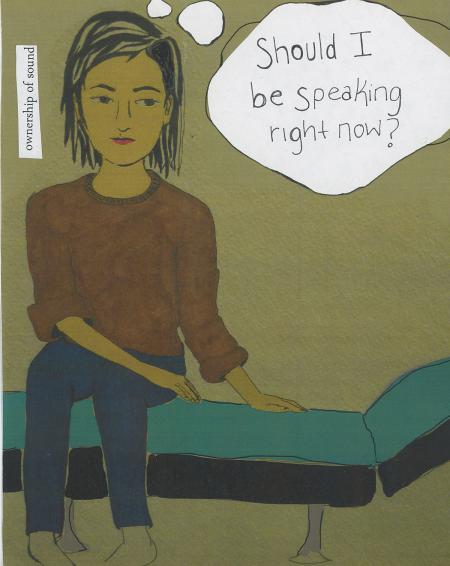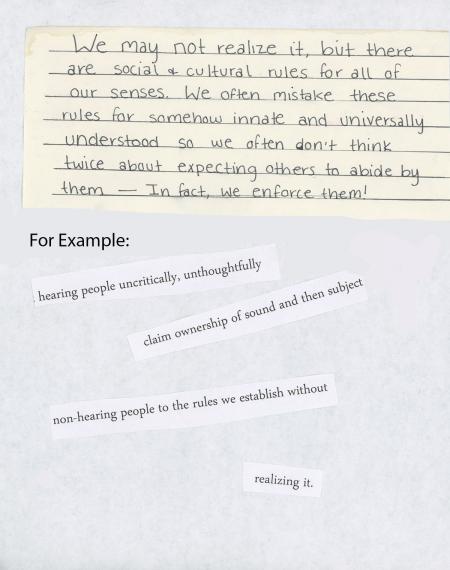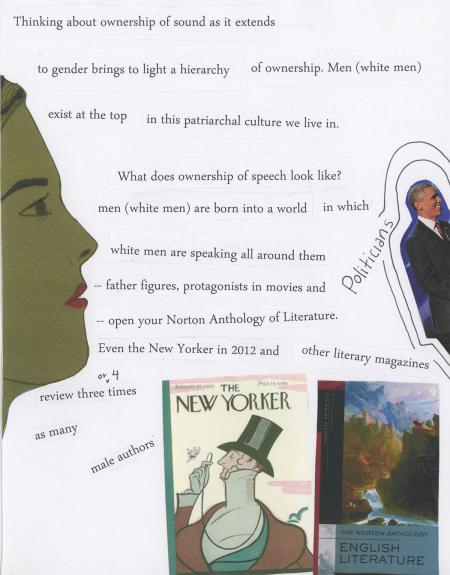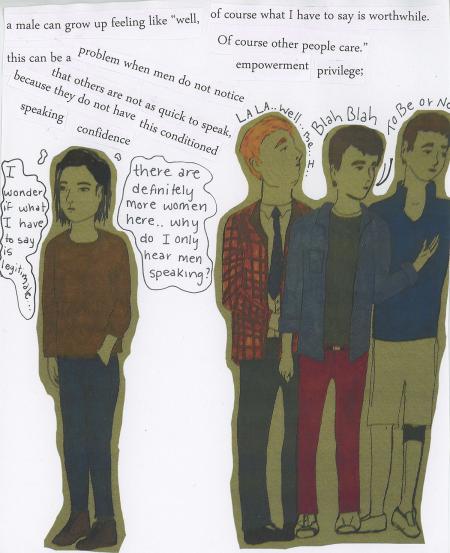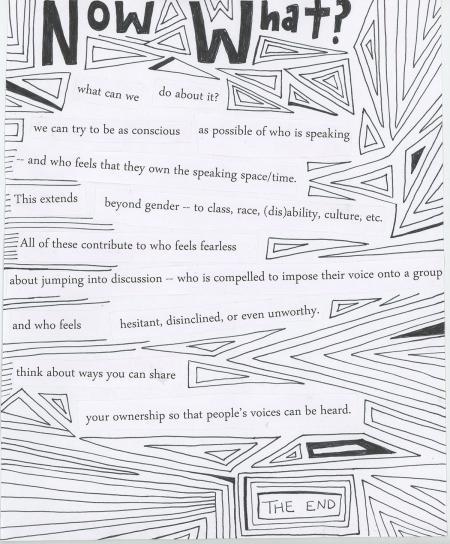Serendip is an independent site partnering with faculty at multiple colleges and universities around the world. Happy exploring!
Walled Women


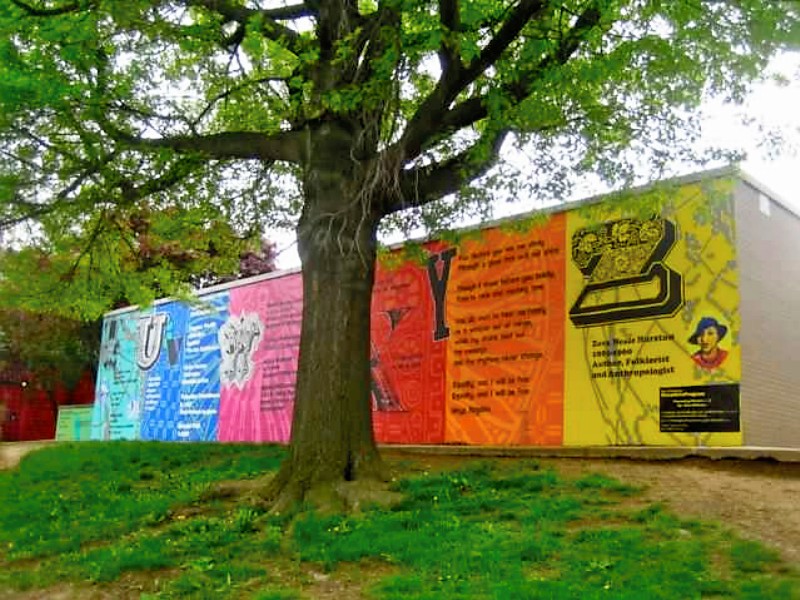
POST YOUR THOUGHTS HERE
Welcome to the on-line conversation for Women in Walled Communities, a cluster of three courses in a new 360° @ Bryn Mawr College that focuses on the constraints and agency of individual actors in the institutional settings of women's colleges and prisons.
This is an interestingly different kind of place for writing, and may take some getting used to. The first thing to keep in mind is that it's not a site for "formal writing" or "finished thoughts." It's a place for thoughts-in-progress, for what you're thinking (whether you know it or not) on your way to what you think next. Imagine that you're just talking to some people you've met. This is a "conversation" place, a place to find out what you're thinking yourself, and what other people are thinking. The idea here is that your "thoughts in progress" can help others with their thinking, and theirs can help you with yours.
Who are you writing for? Primarily for yourself, and for others in our cluster. But also for the world. This is a "public" forum, so people anywhere on the web might look in. You're writing for yourself, for others in the class, AND for others you might or might not know. So, your thoughts in progress can contribute to the thoughts in progress of LOTS of people. The web is giving increasing reality to the idea that there can actually evolve a world community, and you're part of helping to bring that about. We're glad to have you along, and hope you come to both enjoy and value our shared explorations. Feel free to comment on any post below, or to POST YOUR THOUGHTS HERE.

End or start
It’s still very hard to believe we are coming to the last week of the semester and end of the 360 journey. However, even till the end, we were still able to explore silence from another perspective.
I really enjoyed visit of sister Linda on Thursday. Her stories offered me another opportunity to see the power of silence.
One point she mentioned really touched me about silence. She said silence is pregnancy not emptiness and through silence she can hear voices of God and fell unbelievably loved. Wow, what a beautiful state of mind and enlightenment she was able to feel through such silence. I was particularly moved by her choice of word of pregnancy. Pregnancy, from my point of view, is one of the beautiful processes to bring miracles to this world. She indeed viewed silence as her ways of holding many things she was not able to deal with.
I was shocked by her actual experience of not talking much for over a month. Such a long time of period of organizing her stuff to realize better understanding of oneself was absolutely wonderful. I envy her courage to be able to get away from all the trivial routines in daily life to just be with oneself.

More Thoughts on Silence
From the beginning of our 360 experience, I have always been curious as to why we, including myself at times, are uncomfortable with silence. I guess over the weeks, I have found general answers to this question especially from Chittister when she says, "Silence frightens us because it is silence that brings us face to face with ourselves." However, this does not give me any specific reasons. What about ourselves do we not want to face? Is it always something bad, for example a heartache or is it, at times, a positive--innate goodness? Why wouldn't we want to face the positive? What is questioned or what fundamental beliefs are challenged when we fully immerse ourselves in silence alone and with others?
I agreed with Chittister when she said that, in essence, daily noises "protect us from listenig to ourselves" but I think this statement does not acknowledge that the individual who is surrounded by noise has agency. It is not that the environment around us is forcing its noises on us, I feel like it is more of individuals allowing it to do so. As Professor Beard said, silence is "hardly quiet" so how and why do people go about choosing which noises, external or internal, they want to hear?

What does a nun look like? Sound like?
My main Sunday post is here in response to Chandrea's but I just wanted to throw something extra out there. My friend, who is a student consultant one of the college's search committee for new professors, was shocked to find out that Linda-Susan, who has a position on the same committee, is a nun. I was intrigued that this fact had never come up in the many conversations they'd had together. After telling my friend about the topic of our discussion on Thursday, I asked if Linda-Susan seemed especially contemplative to her. This came out of Linda-Susan's answer to my question that the Sisters at her monastary take strides to bring contemplation and contemplative conversations into places that they don't seem to exist. While of course this was probably not something that could be exeptionally visible to my friend, she did say something interesting in that Linda-Susan often "played devil's advocate" during their discussions. So now I'm wondering -- what place does pushing back have in contemplation? Where does disagreement fit in? By playing devil's advocate does Linda-Susan attempt to prompt her colleagues into deeper contempation over a subject?

Thursday's Silence Class
"Sometimes it's harder to attain inner silence than outer silence. The dog stopped barking and the kids have gone to bed, but your mind has a lot to talk about and it knows you can't pretend you're not at home." -Linda Solegato
I stumbled across this quote today and it reminded me of Thursday's class with Professor Beard. I thought she had such a peaceful presence about her, but the end of the conversation made me a little uncomfortable. We talked about the Chittister text and our discomfort with silence because "it is silence that brings us face to face with ourselves" (Chittister).

Eva's crazy way of keeping silent for protection
While reading Eva’s Man, I grew more and more frustrated when her writing became more complex. I became frustrated because I lost access to a transparent storyline; as I got more confused, I got to a point where I realized that I did not have to understand what was going on. I had an epiphany that Eva’s Man seemed to be the quintessence of Doris Sommer’s piece Advertencia/Warning. Doris Sommer claims that readers “feel entitled to know everything as they approach a text … with the conspiratorial intimacy of a potential partner” in this case I became the reader who was trying to know and understand everything that was going on. She then proceeds to write, “the slap of refused intimacy from uncooperative books can slow readers down, detain them at the boundary between contact and conquest”. At first I found myself slowing down and re-reading the passage, until I realized that no matter how many times I read it, the text was meant to make me confused and to get the sense of confusion and craziness.

voice conversation about "play"
Last week we were talking a lot about "play" in class and this ended up seeping into another conversation in one of my other classes outside the 360 with Anne. Here's a link to that conversation if any is interested/wanted to further our conversations about the links between play and learning: /exchange/divergent-thinking#comment-139691
I think some of these comments are relevant to our voice discussion about what play means or does not mean!

Smoking on Bryn Mawr College's Campus: Representing the Power of Student Participation in the Student Government Association
My initial interest was the “rules” of Bryn Mawr Campus and ways in which students either resisted or followed these rules. I eventually narrowed my focus to smoking on campus, after coming across a series of correspondences through student publications in regards to Student Government Association’s involvement in determining the social regulations of students’ lives. More specifically, these “correspondences” focused on campus drinking and smoking amongst students. In the Spring of 1944, the Lantern, one of Bryn Mawr’s student literary magazines, issued an aggressive editorial calling upon the student’s radical abolition of the Student Government Association. Students who crafted this editorial were tired of staying “silent” when it came to rule breaking, writing that, “Rules are being broken. Those who find the rules unreasonable to maintain soon find that the risk of being caught is considerably reduced by discreet silence.” They claimed that Student’s obvious resistance to the rules was indicative of unfair policy and too-strict rules. Without restrictive policy governing their conduct, student would no longer have to remain silent or risk categorization as “rule-breakers.”

Research on Nonviolent Direct Action as it Intersects with Race and Class at Bryn Mawr: A Narrative
On Saturday, the Earth Quaker Action Team (EQAT) organized a Day of Action made up of 16 different actions at PNC Banks across 6 sates in the region, part of their campaign agains PNC's investments in companies that practice mountaintop removal coal mining. Bryn Mawr College had a very large role in this event, as the Bryn Mawr Earth Justice League's action was one of the largest with over 25 people attending. In our own little group (EJL) it sometimes feels like we're the only ones on campus doing this kind of activism, that Bryn Mawr as an institution, in its propoganda about fostering desire to make a meaningful contribution to the world, does not inspire in us while we are in college. We get the sense that, for the majority of the campus, academia far outweighs activism in importance, and we can put time into making the world a better place once we've graduated.

Thoughts on everyone's papers
I’ve really enjoyed reading through everyone’s papers/projects, and while I know that for much of the class, their projects for Jody are leading into their final activism for the class, I wish that there was more of a link. In particular, I think that it would be GREAT if Chandrea and Esty’s tour (if they’re interested in this) could be incorporated into the final presentation, as a way for the larger campus community to be exposed to what we have been talking about in a very visceral, real way. I know that many McBride students have expressed feeling both very conspicuous and invisible at the same time, so I think that somehow sharing Sharaai’s paper would also mean a lot to current McBride scholars. This is also true for HSBurke’s paper on the history (and lack of historical documentation) of maids/servants at Bryn Mawr – this is not a conversation that I hear a lot of people hearing. And Owl’s paper too. I don’t know if any of you are actually interested in publicly sharing your work, but I do think that it might be a powerful way of sharing our exploration of Bryn Mawr’s “walled community” with the rest of campus.

The Japanese and Chinese Scholarship
Forewarning: this is going to be real piecemeal and not that comprehensive. Here's also Erin's post that talks a lot about two early east Asian students on campus.
As Erin points out, surprisingly enough, there is a deep-rooted history of East Asian, more specifically, Japanese, and then a short time later, Chinese students, on campus. To speak of the Japanese students first, in 1893, a Quaker woman named Mrs. Wistar Morris founded what was called the Japanese Scholarship program. I found an opening speech within the special collections archives that describes a little about the beginnings of this program:
"In 1893...Mrs. Wistar Morris...was a friend and believed in foreign missions which at that time the Quakers did not. So after speak about it in meetings for some time with not results she decided she better go herself which she did. Her husband accompanying her."

Two Asian student at early time in Bryn Mawr
As the historical background for the final project, this broadcast is aim to introduce you about two excellent Asian Students at very early times in Bryn Mawr history. Since this is not the final narrative, the broadcast might vary in some perspectives.
The purpose of our final project is to explore the Asian Identity on campus and possible reasons for the absences for their voices nowadays on campus.
I will introduce two extraordinary early Asian students at very early times in Bryn Mawr campus, one Japanese student Tsuda Umeko and one Chinese student Fung Kei Liu. When digging in the past of Asian students on Bryn Mawr campus, these two especially caught my attention due to the similarities in their stories.
Asian Students has been on this campus since the very beginning. Interaction with some representative of Asian countries, China and Japan, both went back to as early as end of 19th century. Besides the conventional admission of students from these countries and Asian Americans, Bryn Mawr‘s first connection with China, oddly enough, was a results of the anti-foreign Boxer Rebellion of 1899; The formal introduction of programs for students from China, however, didn’t happen until 1917.

Religion as a force of good/tool of evil
As I started de la Cruz, I was immediately reminded of Machiavelli’s “The Prince,” as both writers were able to address an enemy with supposed kindness and respect, only to subtly rip them apart. While de la Cruz and Machiavelli were being politically prescriptive in very different ways – and with very different objectives in mind – de la Cruz’s exploit of the power and fear of god mirrors how Machiavelli argued religion is used in the larger societal context (e.g, to convince men to risk their life in war, because they will be going to heaven).
In the case of de la Cruz, she was being told that she shouldn’t be writing because the Church didn’t think it was appropriate for women (a nun!) to write about the topics that she tried to tackle. But she then threw the religious excuse right back, explaining that “God graced me with of a gift of an immense love for the truth…. God Almighty knows why and for what purpose. And he knows I've asked him to snuff out the light of my mind and leave only what's necessary to keep his commandments.” How can anyone argue with God’s creation? de la Cruz makes her case by drawing from scripture. “I see a Deborah issuing laws in military matters as well as political affairs while governing a people among whom there were so many learned men…I see so many significant women: some adorned with the gift of prophecy, like Abigail; others with persuasion, like Esther; others, with piety, like Rahab; others with perseverance, like Hannah.”

Reflections on Prayer
I have many different feelings about prayer.
On one level, it’s a representation of something I’ve stepped away from. For a little over a year, I was the youth representative on my Presbyterian Church’s session, which is the governing body of the church. It’s a lot like our government. Session meets regularly to discuss whatever current issues are brought before them. There are committees delegated to handle particular issues, and there are committees to delegate each committee. For the entire time I served on session, I did not speak a word. I showed up to meetings, I filled a chair, and I listened patiently to each debate. I watched friends become hostile and impatient with each other. Over the course of the time I was a session member, I watched several other members abruptly resign and leave the church. I was angered by the way money and finances seemed to poison the conversation. The contention that seemed to accompany each meeting, little by little, soured my relationship with the church and I chose not to participate.

Prayer? whaaa?
So with Thrusday’s Silence class came along some “prayer” and when Anne was talking about the activity we were going to do, I could not help but begin to feel a little anxious. And if I can recall correctly, I remember mentioning that in class. Anywho, I just want to reflect on why exactly I felt that way. I think a lot of it has to do with my apprehensions with religion. and I don’t think that these apprehensions really have to do with the idea of religion versus an actual type of religion. The class activity went better than I expected, even though I found myself asking a lot of questions during the praying section and not necessarily having/getting any answers…

Can we have another day of praying?:( Puh-leeezeee?
I enjoyed reading about Professor Beard and Sister Chittiste because they completely shattered stereotypes for me. When I think of a nun, I think of a very quiet, reserved and hidden (dress and location-wise) woman who spends most of her days reading the bible. This image is a little extreme and even though I knew that it was not entirely true growing up, I had nothing to challenge it. So I was surprised to read that Professor Beard doubted her relationship to God and her faith well into adulthood and I was VERY surprised to read about Sister Chittiste's activism and to hear her describe our country so well in the context of sin and belief.


